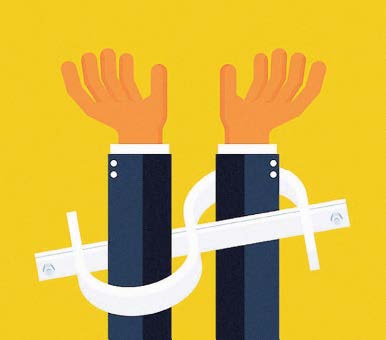Debt Reduction & Stress Relief Go Hand in Hand
BY ROB WRUBEL, CFP®
What keeps you up at night, financially? Is it having too much money in the bank? Too much income? Too many cars, houses or clothes? Unlikely.

BREAK FREE: Monthly payments carry interest that would be better earned and paid to our own accounts instead of a lender.
One significant source of financial stress is owing too much money to too many places. There are other sources of financial concern that create worry and anxiety, but nothing does it quite like having too much debts to pay. Financial planners, bankers and commentators talk about debt to-income ratios to help understand how much debt someone can carry and pay comfortably. My take is a little different. In my world, I think it's important to live a great life today and to prepare for expenses down the road. Comfortable debt payments get in the way of living a great life – carrying debt means we owe money to others no matter what the situation and those monthly payments carry interest that would be better earned and paid to our own accounts instead of a lender. We have more worry in our lives as each dollar needs to be stretched to include interest payments on our loans. There are a few techniques and tips to follow to work your way out of debt. None of them will work unless you are dedicated to the effort. Before you jump into any action items, prepare yourself and your spouse or partner to adapt, learn and grow while maintaining focus on this important action item.
First, take a deep breath. Change doesn't come easy. Envision the life you will have once all your debts are paid, except for your mortgage if you have one. Imagine the peace of mind you have when you slide the amount of your car or student loan payment over to your savings account or into a retirement account – you pay yourself instead of a faceless institution. Now that's financial progress!
Second, list all of your debts. Car loans, student loans, mortgage, furniture, anything you owe to a brother or sister. Put down the amount of the loan, the interest rate, the minimum payment you have to make.
Third, organize these by the amount due. Take out your primary mortgage and the HELOC for now (especially if the HELOC interest is tax-deductible). In my experience, I see that people who pay loans from smallest to largest make headway faster. Intellectually, it would make sense to pay by highest to lowest interest rate, but we love to see progress and paying off small loans quickly feels great.
Fourth, Attack your loans from smallest to largest. Is there a $145 credit card you opened to save money to buy birthday gifts or furniture? Get rid of that first. Instead of paying a bit extra to one loan and a bit extra to another, make the minimum payment on all the loans and apply all the extra money you can scrounge up to the smallest one.
Fifth, Roll the payments. Once you have one loan kicked out of your life, apply the entire payment you were making to the next one. Let's say you have two car loans - one costs $400 per month and the other $250 and the one with the smaller payment is the smaller loan. Once that's gone, take that extra $250 per month and put it to the other car. This will accelerate the process and get you out of debt faster.
Sixth, Keep going until everything but the mortgage is paid.
Seventh, Celebrate. You've done what most people won't and put yourself in position to live a great life, save for the future, and enjoy each day without the worry of debt. Take a moment to enjoy it and use part of the extra money in your pocket to enjoy your success.
In my financial planning practice, I see people's net worth accelerate when they move from paying others to paying themselves by putting money into emergency funds, escrow accounts, retirement accounts and other vehicles for future needs. It's exciting to see it happen and it all starts with your decision to stop worrying about your financial life and deciding today is the day to take steps to move from fear to joy, from worry to control and to embrace each day as you plan for the future.•
ABOUT THE AUTHOR:

Rob Wrubel is a CFP who has a daughter with Down syndrome. He is recognized as a leading expert on financial planning for families with special needs members. Wrubel has written two books about financial planning and special needs families — Financial Freedom for Special Needs Families: 9 Building Blocks to Reduce Stress, Preserve Benefits, Create a Fulfilling Future and Protect Your Family: Life Insurance Basics For Special Needs Planning — and he has been published recently by Law360.com and The Good Men Project. Wrubel holds the Certified Financial Planning (CFP®) designation, the Accredited Investment Fiduciary® (AIF®) designation from Fi360, and the Accredited Estate Planner (AEP®) designation from the National Estate Planning Council.